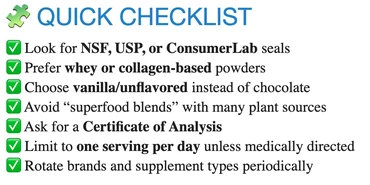More than two-thirds of products tested exceeded recommended levels of heavy metals
- Report finds two-thirds of tested powders exceed safety limits
- Plant-based, organic, and chocolate-flavored products top the risk list
- Experts say contamination comes from soil, manufacturing, and flavoring agents

A new round of independent testing has found that many protein powders still contain measurableand sometimes alarmingamounts of lead and other heavy metals. Despite years of warnings, researchers say contamination remains a widespread problem in the booming $8 billion supplement market.
In its latest analysis of 23 popular powders and ready-to-drink shakes, Consumer Reports said that more than two-thirds contained more lead per serving than its recommended daily safety benchmark. Several exceeded that limit tenfold. Elevated levels of cadmium and inorganic arsenic were also detected in some samples.
Plant-based powders made from peas, rice, or hemp were consistently the worst offenders. Dairy-based and collagen products generally fared better, but none were completely free of heavy metals.
Clean Label Project finds similar results
A separate investigation by the Clean Label Project earlier this year reached nearly identical conclusions. Testing 160 powders from 70 brandsrepresenting roughly 80% of the marketit found that 47% exceeded Californias Proposition 65 limits for at least one toxic metal. Organic and chocolate-flavored formulas were most likely to test high.
Californias Prop 65 threshold for lead0.5 micrograms per dayis far stricter than federal guidance. The FDAs Interim Reference Level allows 8.8 micrograms per day for women of childbearing age and 2.2 micrograms for children. Industry groups argue that the states standards are unrealistically low, but consumer advocates counter that no amount of lead is truly safe.
Heavy metals occur naturally in soil and water, but experts say contamination can also happen during manufacturing or from added ingredients like cocoa powder. Pea and rice proteins are especially vulnerable because the plants readily absorb metals from the soil.
What consumers can do
Nutritionists recommend buying powders that carry third-party certifications, such as NSF Certified for Sport, USP Verified, or ConsumerLab.com approval. Those seals indicate that a product has been independently tested for contaminants.
Other steps:
-
Favor whey or collagen-based powders over plant-based varieties.
-
Choose vanilla or unflavored options instead of chocolate.
-
Treat powders as a supplementnot a substitutefor food-based protein.
If youve bought one of these protein powders
Check the label.
Look for the products lot number and manufacturer. Cross-reference it with the latest lists from Consumer Reports or Clean Label Project. If your brand was included in recent testing, see whether it exceeded safety limits.
Ask for a Certificate of Analysis (COA).
Reputable supplement makers will provide a COA from a third-party lab verifying heavy metal levels. If the company refuses or provides only vague assurances, treat that as a red flag.
Stop using suspect products immediately.
Lead and cadmium accumulate over time. If youve been consuming a powder daily, discontinue use and switch to a certified low-contaminant brand.
Report it.
File a complaint with the FDAs MedWatch program or the California Attorney Generals Office if the product makes misleading clean or heavy metalfree claims.
Consider medical testing.
If youve used large quantities for monthsespecially if pregnant, breastfeeding, or giving it to childrenconsult your doctor about a blood lead test.
PREVENTION TIPS
-
Dont chase natural labels. Organic certification doesnt guarantee puritymetals come from soil, not pesticides.
-
Mind the serving size. Even safe products can exceed exposure limits if you double-scoop.
-
Blend whole foods instead. Greek yogurt, eggs, tofu, or nuts provide comparable protein without the contamination risk.
-
Avoid powders marketed for kids. Children are more susceptible to leads neurological effects.
Posted: 2025-10-14 16:25:10















